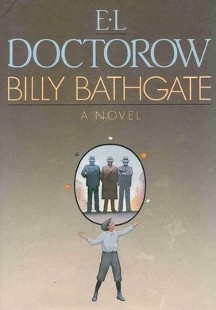
Charles "Lucky" Luciano was an Italian-born gangster who operated mainly in the United States. Luciano started his criminal career in the Five Points gang and was instrumental in the development of the National Crime Syndicate. Luciano is considered the father of modern organized crime in the United States for the establishment of the Commission in 1931, after he abolished the boss of bosses title held by Salvatore Maranzano following the Castellammarese War. He was also the first official boss of the modern Genovese crime family.

Edgar Lawrence Doctorow was an American novelist, editor, and professor, best known for his works of historical fiction.

Dutch Schultz was an American mobster based in New York City in the 1920s and 1930s. Schultz made his fortune in organized crime-related activities, including bootlegging and the numbers racket. Schultz's rackets were weakened by two tax evasion trials led by prosecutor Thomas Dewey, and also threatened by fellow mobster Lucky Luciano. Schultz asked the Commission for permission to kill Dewey, in an attempt to avert his conviction, which they refused. When Schultz disobeyed them and made an attempt to kill Dewey, the Commission ordered his murder in 1935. Schultz was shot at a restaurant in Newark and died the next day.

A Bronx Tale is a 1993 American coming-of-age crime drama film directed by and starring Robert De Niro in his directorial debut and produced by Jane Rosenthal, adapted from Chazz Palminteri's 1989 play of the same name. It tells the coming of age story of an Italian-American boy, Calogero, who, after encountering a local Mafia boss, is torn between the temptations of organized crime and the values of his honest, hardworking father, as well as racial tensions in his community. The Broadway production was converted to film with limited changes, and starred Palminteri and De Niro.
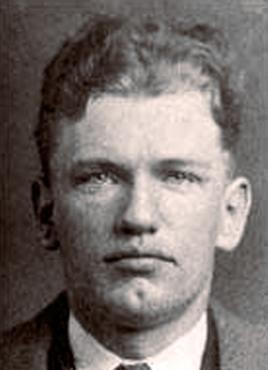
Vincent "Mad Dog" Coll was an Irish-American mob hitman in the 1920s and early 1930s in New York City. Coll gained notoriety for the allegedly accidental killing of a young child during a mob kidnap attempt.
Otto Biederman, known as Otto "Abbadabba" Berman was an accountant for American organized crime. He is known for having coined the phrase "Nothing personal, it's just business."
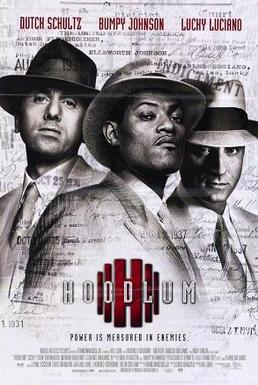
Hoodlum is a 1997 American crime drama film that gives a fictionalized account of the gang war between the Italian/Jewish mafia alliance and the black gangsters of Harlem that took place in the late 1920s and early 1930s. The film concentrates on Ellsworth "Bumpy" Johnson, Dutch Schultz, and Lucky Luciano.

Samuel "Red" Levine was an American mobster, described as head of Lucky Luciano's hit squad of Jewish gangsters.

The March: A Novel is a 2005 historical fiction novel by E. L. Doctorow. It won the PEN/Faulkner Award for Fiction (2006) and the National Book Critics Circle Award/Fiction (2005).

The Last Words of Dutch Schultz is a closet screenplay by Beat Generation author William S. Burroughs, first published in 1970.

Mafia!, also known as Jane Austen's Mafia!, is a 1998 American crime comedy film directed by Jim Abrahams and starring Jay Mohr, Lloyd Bridges, Olympia Dukakis and Christina Applegate.

Billy Bathgate is a 1991 American biographical gangster film directed by Robert Benton, starring Loren Dean as the title character and Dustin Hoffman as real-life gangster Dutch Schultz. The film co-stars Nicole Kidman, Steven Hill, Steve Buscemi, and Bruce Willis. Although Billy is a fictional character, at least four of the other characters in the film were real people. The screenplay was adapted by British writer Tom Stoppard from E.L. Doctorow's 1989 novel of the same name. Doctorow distanced himself from the film for the extensive deviations from the book. It received negative reviews and was a box office bomb, grossing a mere $15.5 million against its $48 million budget.
Karen Friedman Hill is an American known for her involvement in the American Mafia through her husband Henry Hill, who was an associate of the Lucchese crime family. The events of their lives were chronicled in the 1990 film Goodfellas and several books.

Jack Dempsey's Broadway Restaurant, known popularly as Jack Dempsey's, was a restaurant located in the Brill Building on Broadway between 49th Street and 50th Streets in Manhattan, New York City.

Abraham "Bo" Weinberg was a Jewish New York City mobster who became a hitman and chief lieutenant for the Prohibition-era gang boss Dutch Schultz. As Schultz expanded his bootlegging operations into Manhattan during Prohibition, he recruited Abe Weinberg and his brother George into his gang. Abe Weinberg would become one of Schultz's top gunmen during the Manhattan Bootleg Wars and was a suspect in the later high-profile gangland slayings of Jack "Legs" Diamond, Vincent "Mad Dog" Coll, and mob boss Salvatore Maranzano.
Mafia films—a version of gangster films—are a subgenre of crime films dealing with organized crime, often specifically with Mafia organizations. Especially in early mob films, there is considerable overlap with film noir. Popular regional variations of the genre include Italian Poliziotteschi, Chinese Triad films, Japanese Yakuza films, and Indian Mumbai underworld films.
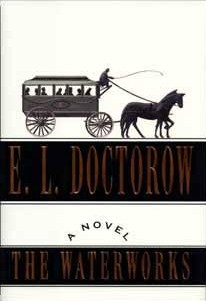
The Waterworks is a novel by American writer E. L. Doctorow, published in 1994.
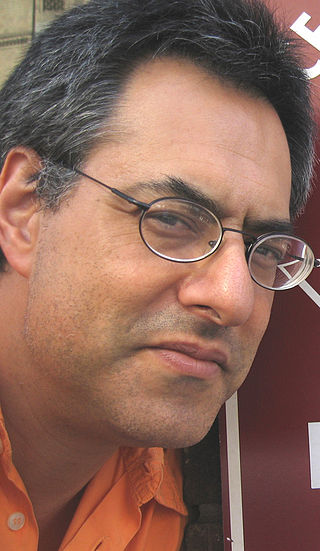
Mitch Berman is an American fiction writer known for his imaginative range, exploration of characters beyond the margins of society, lush prose style and dark humor.
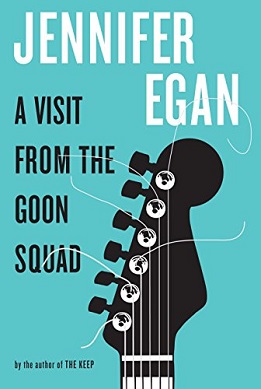
A Visit from the Goon Squad is a 2011 Pulitzer Prize-winning work of fiction by American author Jennifer Egan. The book is a set of thirteen interrelated stories with a large set of characters all connected to Bennie Salazar, a record company executive, and his assistant, Sasha. The book centers on the mostly self-destructive characters of different ages who, as they grow older, are sent in unforeseen, and sometimes unusual, directions by life. The stories shift back and forth in time from the 1970s to the present and into the near future. Many of the stories take place in and around New York City, although other settings include San Francisco, Italy, and Kenya.

Black Hand is a 1950 American film noir directed by Richard Thorpe and starring Gene Kelly as an Italian immigrant fighting against the Black Hand extortion racket in New York City in the first decade of the 20th century.
